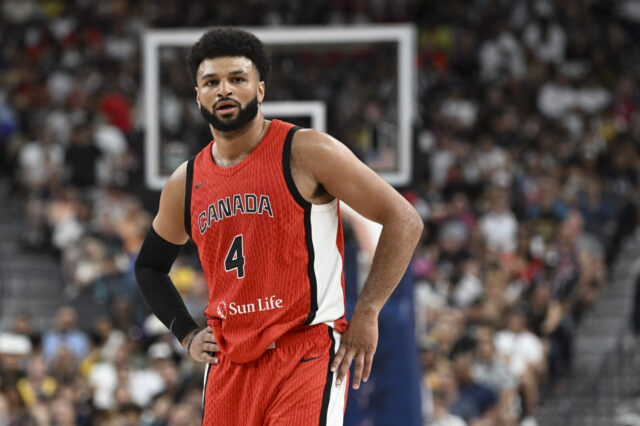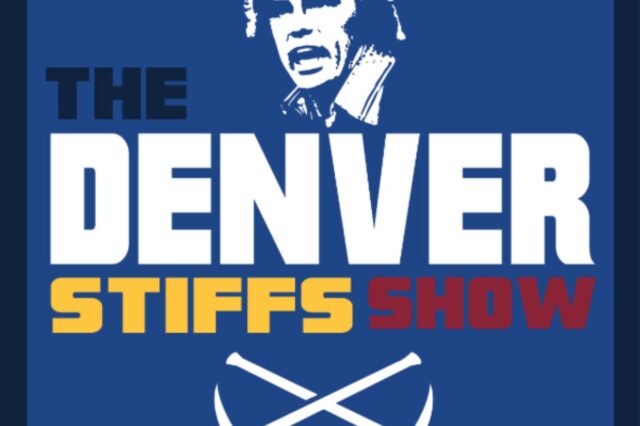For the first time in a long time, the Denver Nuggets had a top five Most Valuable Player candidate on their roster. Nikola Jokic placed fourth in MVP voting in 2018-19, becoming the first Nugget to do so since David Thompson in 1977-78. Thompson was also the last Nugget to appear on the All-NBA First Team. Jokic did as well. It’s been a long time since the Nuggets have had a player as talented and conducive of winning as Jokic is today.
But is it possible for Jokic to ever actually win an MVP award?
It may never actually happen, but the Jerami Grant trade brought that reality one step closer.
An Elite Fit at forward
When looking around the NBA, there are few available players that fit the Denver Nuggets roster better than Jerami Grant. Sure, a healthy Kevin Durant, Giannis Antetokounmpo, or Kawhi Leonard would be nice, but in terms of available players, Grant is at or near the top of the list.
The ideal forward playing next to Nikola Jokic in the Denver Nuggets scheme must possess the following traits:
- Athleticism both laterally and vertically
- Defensive mindedness and a willingness to hustle
- Shooting touch
- Low offensive usage
- Off-Ball tendencies
Statistical indicators for the above traits are easy to find because they stand out so clearly:
This content is no longer available.
Only the above six forwards hit the first four statistical indicators of under a 20% usage rate, greater than 35% from three-point range, and greater than 1% steal rate and 2% block rate. These statistics are meant to showcase players that excel in the desirable categories needed to highlight Jokic’s strengths as a basketball player. The above six forwards can space the floor, defend, and don’t need the ball in their hands to make an impact on the game.
Taking it one step further, I have added the respective statistics for Defensive Real Plus-Minus and total dunks to further highlight why Grant makes sense on the Nuggets roster. He’s the best athlete among the above group, separating him as perhaps the best complementary power forward to fit with Nikola Jokic in the NBA (there are other players at small forward that provide a similar dynamic).
Grant’s best skills offensively centered around his chemistry with Russell Westbrook serving as a facilitator. Grant would often find a hole in the defense in the paint or along the baseline to become open for a quick Westbrook pass. He would then use his strong finishing ability (67.9 FG% on shots from 0 to 3 feet) to convert those opportunities, with over 80% of those shots being assisted by a teammate. He finds the easy hole in the Denver defense on this possession.
This is Jokic’s bread and butter, and it’s easy to see Grant and Jokic connecting on similar cuts to the basket.
In addition, Grant spots up around the perimeter nicely, using a gentle release after he catches the ball on a pass either swinging around from the perimeter or kicked out from the paint. Grant shot 39.7% on catch & shoot three-pointers last year, and he will have similar opportunities in Denver’s offensive scheme.
It may take some getting used to the unique scheme in Denver centered around a playmaking big man, but Grant has the motor to operate out of the short corner like Kenneth Faried and the perimeter skills to operate on the wing like Wilson Chandler. At their ceilings, both guys played well off of Jokic’s pass-happy game, and the offensive efficiency with one of Chandler or Faried at power forward during the 2016-17 season was absurdly high. If Grant could replicate those skills while maintaining solid defensive play, the Nuggets have a lot to work with when either Paul Millsap or Grant is out there with Jokic.
Dependability
It’s been said frequently and I will say it again: the Nuggets are an injury hazard. Every season, one of Denver’s key contributors goes down with a substantial injury for at least a month of the season. This past year, it was both Gary Harris and Will Barton. The year before, it was Millsap.
So far, Grant has had limited injury issues during his NBA career (knock on wood). In each of his five seasons, Grant has maintained the following games played totals:
- 2014-15 – 65
- 2015-16 – 77
- 2016-17 – 80
- 2017-18 – 81
- 2018-19 – 80
The best ability is availability, and Grant has that in spades. Playing over 2,600 minutes last season, Grant ranked 19th in the NBA in total minutes played. The Thunder needed him on the floor, just like the Nuggets need Millsap on the floor as the best option next to Jokic every night. Now, the Nuggets have a workhorse who can soak up minutes at power forward and possibly small forward and center for when (not if) those injuries come.
In addition, as both Tim Connelly and Michael Malone raved about Grant at his introductory press conference today, the most popular message was that both Connelly and Malone loved Grant “the person” as well as Grant “the player:”
People like Grant play hard no matter what. It’s possible that he will come off the bench the entire season, but from what I understand, that will only drive Grant to work harder at his craft and continue to improve him game. The Nuggets run a system in which Michael Malone prioritizes players that are willing to sacrifice offensively in order to give 100% effort and execute consistently. Grant is the perfect player for that mold. He will fly around on both ends, go after loose balls, and his effort will never wane. That dependability fuels championship teams, and it makes everyone else’s lives just a bit easier.
It’s this dependability and high energy motor that Jokic will learn to love. Figuring out how to play with new players and learning to execute quickly is half the battle. Grant possesses a player type that Jokic is highly familiar with due to his experience playing with Faried and Mason Plumlee. There are some differences to be clear, but it’s easier to fit in and be a dependable cog in the wheel of success when there’s a clear path forward. The Nuggets utilized Faried in 2016-17 in a way that I expect Grant to mostly operate. Sometimes, he will be stationed in the corner as opposed to operating the baseline, but his experience and willingness to play that less glamorous role is key to generating easy baskets offensively. It’s Grant’s willingness to fly around defensively that will make up for Jokic’s slower feet.
Being available is half the battle. Excelling within an outlined role is another. Grant offers a confluence of both ideals and should help Jokic be even more successful.
Best player on best team generally wins MVP
There are exceptions of course, and in today’s NBA with no clear front-running team, this is the year for an outstanding individual season to claim the award rather than simply a “great” season on the best team.
Still, the Nuggets could be the best team in the NBA next year. Every team ahead of them sustained significant losses. The NBA champion Toronto Raptors just lost Finals MVP Kawhi Leonard and sharpshooting wing Danny Green. The Golden State Warriors juggernaut just lost Kevin Durant to the Brooklyn Nets and Klay Thompson to injury, though they did pick up D’Angelo Russell. The Milwaukee Bucks retained most of their pieces but lost starting guard Malcolm Brogdon and backup big Nikola Mirotic. Both played reasonably important roles on a 60-win squad (Mirotic being a late season addition) and the Bucks replaced them with Wesley Matthews and Robin Lopez, who aren’t nearly as talented.
Then, the Nuggets were in fourth place, winning 54 games and bringing back nearly the entire roster in addition to adding Jerami Grant. The only major piece they lost? Trey Lyles, who offered the only negative Net Rating next to Nikola Jokic of any player this past season. Replace that with Grant, a better player and an elite fit, and lineups should feature nearly all positive combinations with Jokic on the floor. That will separate him as an impact player statistically, which was a major part of the case for Giannis Antetokounmpo over James Harden as MVP this past year.
If Jokic is playing on a near 60-win team as the only true superstar on the roster, his MVP case becomes as strong as ever. Other teams have star duos in Leonard and Paul George, LeBron James and Anthony Davis, Harden and Westbrook (?!?!) but with Jokic operating as the conductor of a symphony of solid pieces around him, the case will only continue to grow stronger.
Jokic winning MVP would only be a byproduct of a strong move by the Nuggets front office to acquire a starting caliber player, but it’s definitely a possibility. While fitting the right pieces around Joker is important, there’s a major opportunity for Jokic to improve individually. His 30.7% three-point mark was a career low, and with as important as his spacing is to generating an elite offense, a bounce back year from three-point territory would be an excellent indicator of improved MVP stake.
As Jokic becomes more comfortable as a scoring-passing hybrid, he can continue to improve his decision making and feel for situational basketball. He began that process in the regular season and playoffs last year, but a full year of Jokic knowing exactly when to push the pedal to the metal would be dangerous for the opposition.
Finally, Jokic continuing to build up his body and add strength will improve his dominance inside offensively. Very few players can handle him right now, but Giannis used an offseason to become entirely untenable for opposing defenses. Jokic won’t ever get to that level of ripped, but moderate improvement could be the difference in an MVP caliber season.
I’m very high on Jokic’s chances to win MVP this year. Right now, the players on teams with one superstar are the most likely to take home the award. Giannis could repeat. Joel Embiid is in a similar position to Jokic. Stephen Curry could be primed for a big year. But ultimately, Jokic is a great pick on a team that upgraded its weakest rotation link with an elite level complementary piece in Jerami Grant.
It should be a fun year for all involved.


